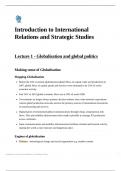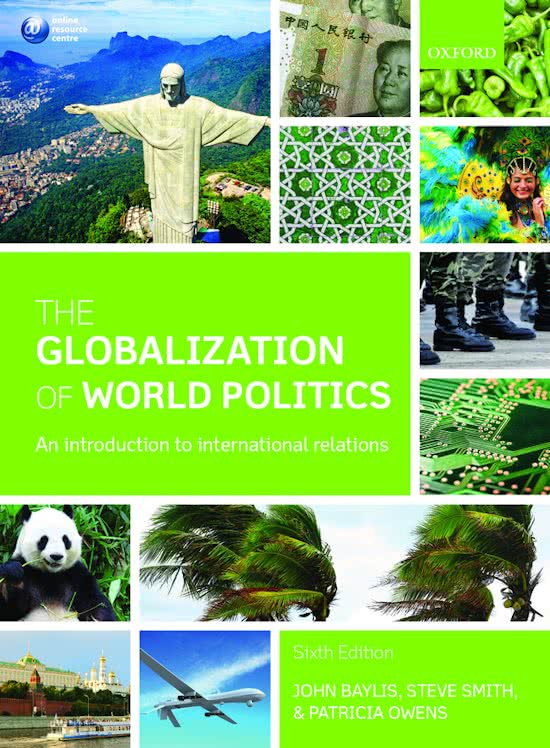Introduction to International
Relations and Strategic Studies
Lecture 1 - Globalisation and global politics
Making sense of Globalisation
Mapping Globalisation
Before the GFC economic globalisation (global flows of capital, trade and production) in
2007, global flows of capital, goods and services were estimated to be 53% of world
economic activity.
Post GFC in 2019 global economic flows are at 39% of world GDP.
Governments no longer always primary decision makers since trans-national corporations
control global production networks and are the primary sources of international investment
in manufacturing and services.
Digitalisation revolutionised global communications through cheap, instantaneous info
flows. This and mobility infrastructures have made it possible to manage JIT production
across continents.
Same communications and mobility infrastructures facilitate criminal and terrorist activity,
making the world a more insecure and dangerous place.
Engines of globalisation
Technics - technological change and social organisation e.g. modern comms
Introduction to International Relations and Strategic Studies 1
, Economics - capitalism’s demand for new markets and profits leads to the globalisation of
economic activity
Politics - ideas, interests and power. Politics provides its normative infrastructure
Globalisation implicated in the emergence of a global risk society where national borders
provide little protection from distant dangers or consequences of systemic failures.
Politics becoming more globalised - sharing of info and collaboration increased.
Cultural globalisation increasing due to increased migration and international tourism of
middle classes being at historic levels (2017).
Approaches to conceptualising globalisation
Materialist - globalisation as a substantive process of increasing worldwide connectivity
which is open to empirical and historical methods of enquiry.
Constructivist - in ideational terms as a discussion, which has no objective or permanent
meaning.
Ideological - conceived as a political and economic project and ideology advanced by the
most powerful to fashion the world order according to their interests.
Analysing Globalisation
Ways to characterise globalisation:
Stretching of political, economic and social activities across national boundaries. Events,
decisions, actions can effect individuals, communities, countries around the globe.
Intensification of interconnectedness in every aspect of modern life.
Accelerating pace of global flows and processes as velocity of ideas, goods, news etc
increases.
Deepening enmeshment of local and global such that they become indistinguishable.
Globalisation associated with process of deterritorialization: as social, economic or political
activities are organised at the transnational levels, they become disembedded or detached
Introduction to International Relations and Strategic Studies 2
, from their locale or place.
Concept of globalisation should be differentiated from universality, which implies
worldwide convergence and inclusivity.
Globalisation is associated with growing global inequality of wealth, life chances and
income.
Frequently perceived as Westernisation, stoking fears of imperialism and provoking anti-
western movements and resistance. Globalisation concept doesn’t assume the process has a
historical logic.
Globalisation associated with process of time-space compression, referring to impact of new
tech of mobility and comms to ‘shrink’ geographical space and time. Highlights relative
denationalisation of power in world politics so far as power is organised and exercised not
on national scale but on trans regional and global scale.
Opacity of power problem for liberal democracies that value accountability highly as it
creates public perception that they’re subject to external forces they cannot control.
Debating Globalisation
Sceptics of globalisation conclude that it is epiphenomenal: a derivative of more primary
forces, such as geopolitics or capitalism. Globalisation scholarship therefore lacks not only
explanatory power, but also offers a misleading interpretation of contemporary world
politics.
Globalists argue that globalisation is a fundamental source of disruptive change in world
politics.
Neo-Marxists explore how global capitalism is reshaping the world order.
Liberals look at how globalisation is creating a ‘flat world’ or an ‘emerging global network
civilisation’ overlaying the inter-state system.
Critical globalisation scholarship looks at how globalisation from below is associated with
new forms of transnational politics and communicative power in world politics.
Introduction to International Relations and Strategic Studies 3
, Transformationalists think this change is connected to big transformations in world politics,
creating a more dangerous and unpredictable world. Globalisation associated with a
fundamental reconfiguration of how power is organised, distributed, exercised and
reproduced.
Crisis of Globalisation and the Liberal World Order
Main Argument Notes
GFC and other shocks have contributed
to the movement of the ‘left behind’ as
- It is a political crisis: international consensus that that
they believed that the GFC and the
promoted and sustained globalisation seems to be dissolving.
recession that followed was as a result
Three developments are threatening this order: Global populist
of the ‘system’. Populist electoral
revolt, Drift towards authoritarianism and return of great power
victories that followed has threatened
rivalry.
globalisation and the liberal multilateral
order that nurtured and sustained it.
- Nationalist populism has built on distrust with mainstream
politics that predates the GFC, combined with growing aversion
of multiculturalism, widening economic inequality and the
decline of traditional party allegiances and class divisions. Shift
in US policy under Trump: emphasis on protectionism,
unilateralism and anti-globalism.
- Authoritarian practices taking hold in liberal democratic states
such as ‘illiberal democracies’ like Turkey and Hungary. Norms
and values that underpin liberal world order are being challenged
openly.
- Great power rivalry and movement from unipolar to a
multipolar world. Rivalry between the US, India, China and
Russia threatens to undermine global stability, which has
sustained the liberal world order and globalisation.
Sceptical interpretations of the end of - This inevitable as it reflects the historical cycle of the rise and
globalisation highlight that it is mainly decline of great powers and the uneven development between
symptomatic of the decline of US countries associated with capitalism. Some realists fear
power. consequences of demise of liberal order and globalisation.
Introduction to International Relations and Strategic Studies 4





